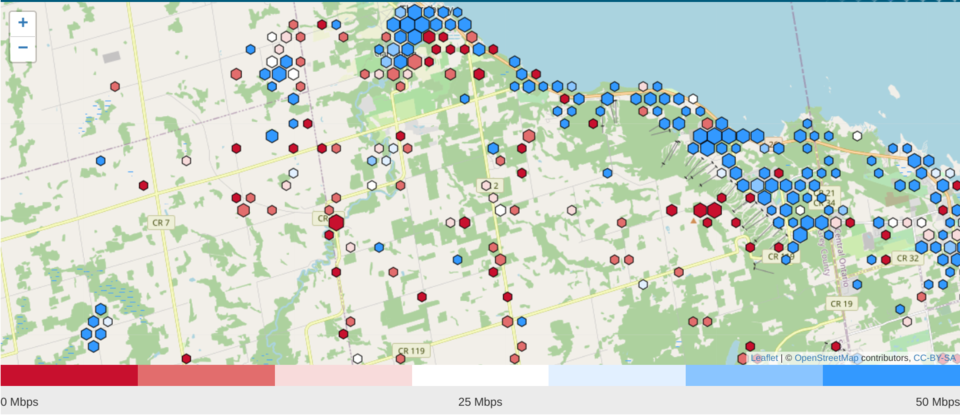Internet speed tests conducted in the Town of The Blue Mountains (TBM) indicate that improvements and service expansion is required across the entire municipality.
“The overall results indicate that built-up areas in the north along the Georgian Bay have the best internet performance, but it is not universal even throughout that area. And, several other locations show extremely poor internet connectivity,” said Grant Street, internet performance test product manager from the Canadian Internet Registration Authority (CIRA).
In an effort to drive investment in broadband locally, TBM launched the Rural Access to Broadband Internet Technology (RABIT) Task Force earlier this year.
In May, RABIT asked all TBM residents to participate in testing their home internet speed through a CIRA Internet Performance Test.
As each user performed the CIRA test, their anonymous data was collected and aggregated into a large dataset. The data provides the ability to compare connection speeds with other people in the neighbourhood, city or across the country.
“As you get away from the Georgian Bay area the connectivity is much worse,” stated Street as he presented the results of TBM’s CIRA testing to council members at a meeting held on Aug. 9.
TBM deputy mayor and chair of RABIT, Rob Potter confirmed that TBM’s preferred method of improving internet service in the municipality will be through fibre optic cable.
“Fibre will be our priority as much as possible. There may be areas of the town that are just not reasonable to think that we're going to get fibre there and so we have to look at the possibility of using other means...towers being one of those,” Potter said.
Street explained that most, but not all, towers use fibre, and that there are also two different kinds of fibre that can be installed.
“One of them is what we call transit fibre, which basically goes from one place to another and is not distributed throughout the community. And the second is distribution fibre,” he said.
“What the major companies do is usually run just the one fibre – the back haul or transit fibre – to the towers, and then end it there. So, it still needs to be distributed from there.”
Street reported that most areas in TBM need to be upgrade, but, he said, the funding that exists is insufficient and will take too long.
He suggested the municipality look at a strategic approach that would focus on partnering with a not-for-profit firm that offers turnkey internet solutions, such as i-Valley.
Through that partnership, the municipality could then aim to create a public, open-access network that any internet service provider can acquire at competitive rates to access the “fibre back haul”.
“Then, what is usually done, is starting with installing fibre to office locations and as many homes as you can with secondary installations of a minimum of 50/10 service using fixed wireless. As you generate revenue from the wholesale costs you'll be charging to use the internet, you can then use that money to both maintain and build the expansion to the network,” Street explained.
Using this strategy, Street added that it would not be unreasonable to expect every home in the community could eventually be hooked up to fibre and in a “not so long timeframe – years as opposed to decades,” he said.
Potter suggested he was onboard with the strategy presented by Street, adding that if TBM is going to do this, “we need to take the bull by the horns and work at it ourselves with the help of people in private industry who are interested in serving our community.”
TBM Mayor Alar Soever suggested further investment in internet services in TBM will likely be something that appears in the municipality’s 2022 budget.
“I think we're now pointed in the right direction and I hope we'll be able to come up with a plan in the next few months to shape this project and make sure we get it into the 2022 budget as well,” Soever said.
Street added that as TBM via RABIT undertakes service upgrades, the CIRA maps and testing will be helpful in showing where improvements are being made and how well they perform.


.png;w=120;h=80;mode=crop)
